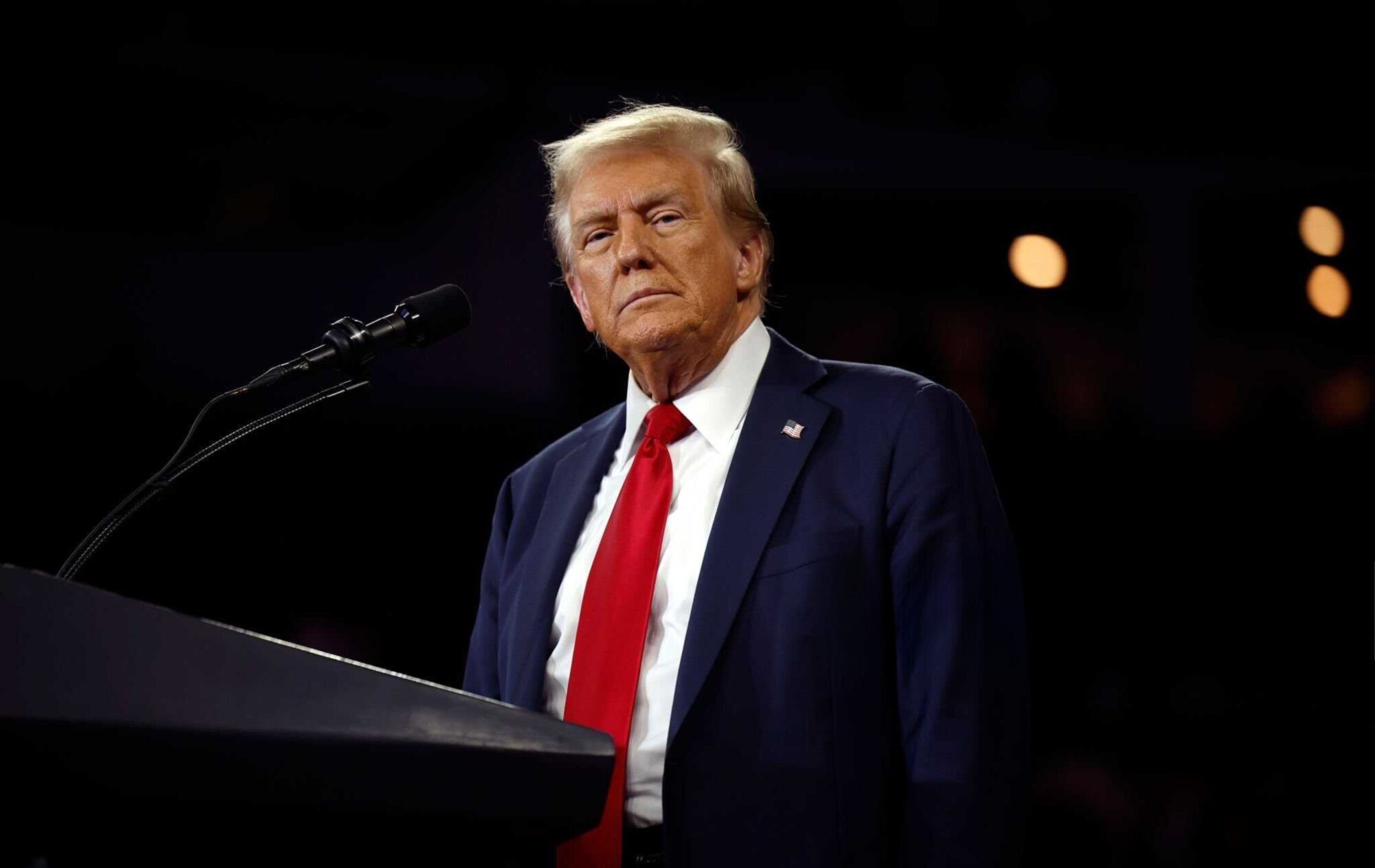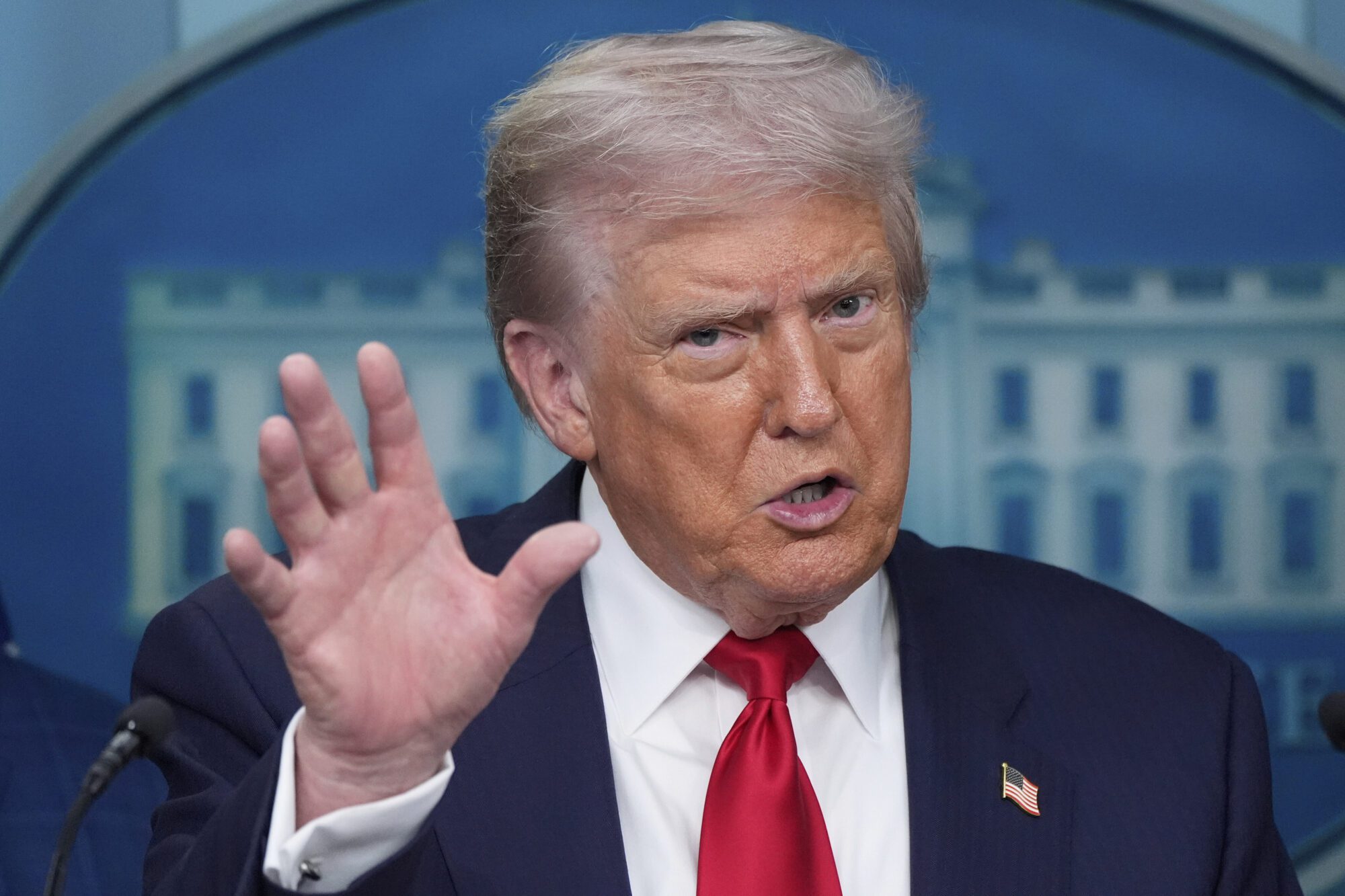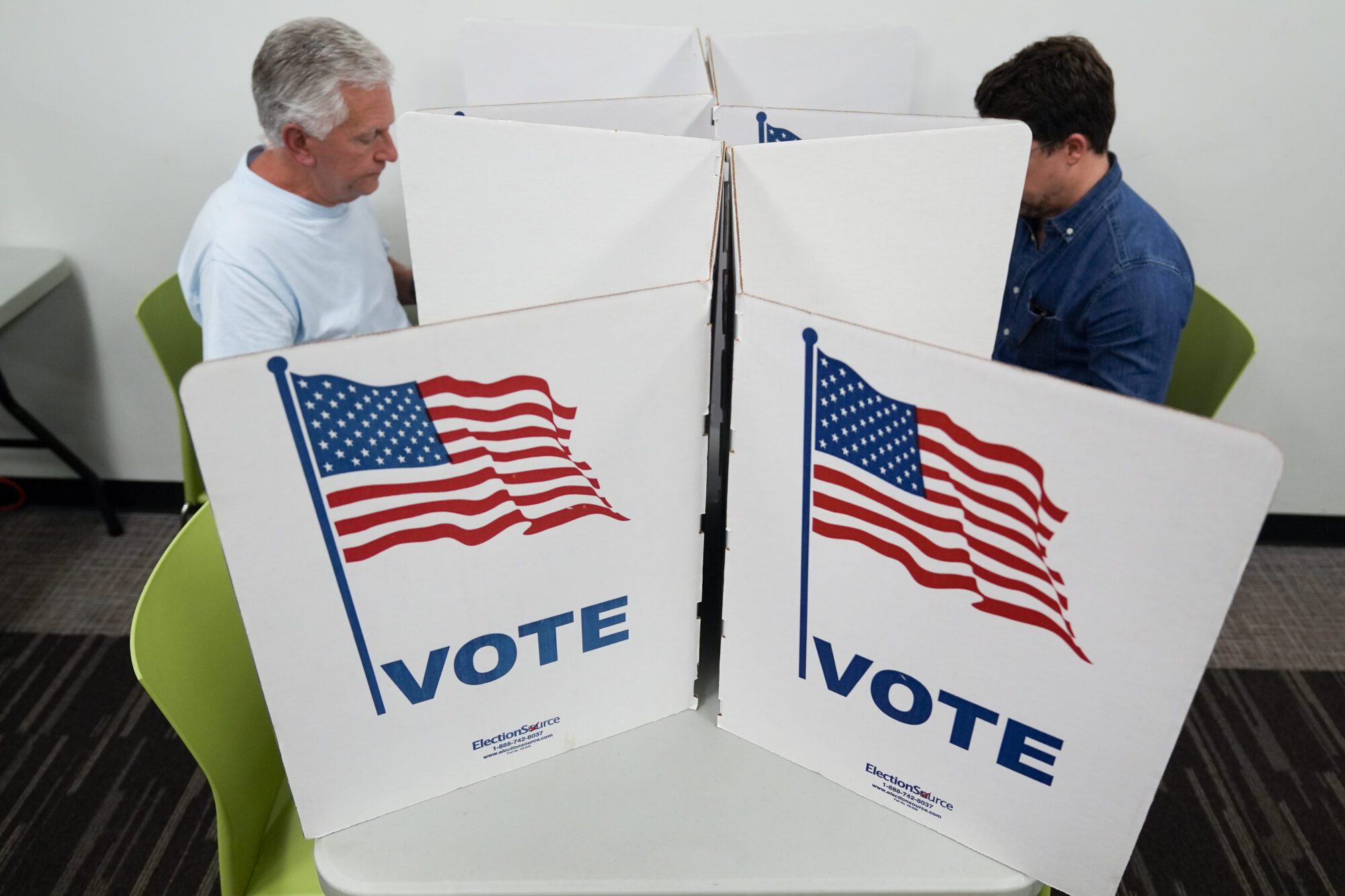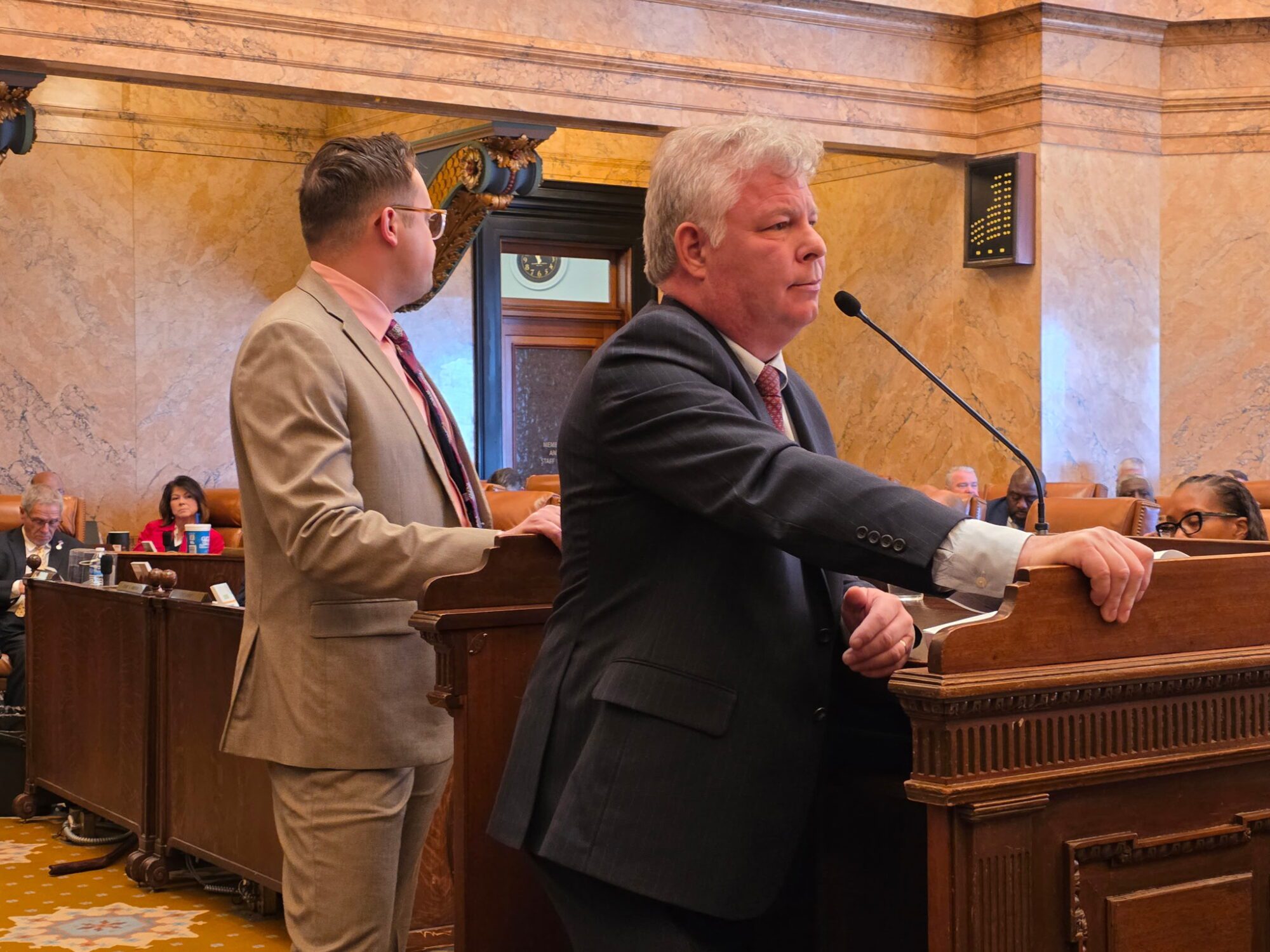
Speaker of the House Mike Johnson, R-La., speaks during a news conference amid threats that Rep. Marjorie Taylor Greene, R-Ga., a staunch ally of former President Donald Trump, is threatening to oust Johnson from his leadership post, at the Capitol in Washington, Tuesday, May 7, 2024. (AP Photo/J. Scott Applewhite)
- Speaker of the U.S. House of Representatives Mike Johnson said there were “no big surprises” in Tuesday’s election, just predictable results. “In the end, blue states voted blue.”
Speaker Mike Johnson shrugged.
With a brave face, the House Republican leader downplayed the results of the first major election since President Donald Trump returned to the White House. He called Tuesday’s outcomes the kind of off-year “anomalies” that excite politicos but “do not portend what happens in the future.” Johnson insisted there were “no big surprises last night,” just predictable results. “In the end,” he told RealClearPolitics, “blue states voted blue.”
The bright spot for Republicans: A rising star – and prime 2026 target – on the left.
Johnson pointed to Zohran Mamdani, the 34-year-old democratic socialist who won the New York City mayoral race, as “the reason I am optimistic” the GOP can maintain its congressional majorities during the midterms next year. He sees the next leader of the biggest metropolis in America as now the biggest liberal liability. “They’ve handed the keys to the kingdom to the Marxist,” Johnson said, “and he will destroy it.”
“House Democrats own the consequences of that election because, remember, Hakeem Jeffries came out and endorsed Mamdani in the end,” the speaker said of the minority leader who hopes to take his gavel next year. “They are all intertwined together, and I think they are going to rue it.”
Johnson joined the RealClearPolitics podcast Wednesday morning as the government shutdown entered its 36th day, setting the record for the longest shutdown in U.S. history. Asked if the election results change his calculus for negotiating with Democrats, Johnson replied matter-of-factly, “No.”
But while Tuesday’s blue wavelet will not undo that logjam on Capitol Hill, it has already buoyed liberal spirits around the country. Democrats won up and down the ballot, scoring victories in gubernatorial races in Virginia and New Jersey, sweeping three state Supreme Court contests in Pennsylvania, and securing ballot measure successes in states from California to Maine. A complete Democratic triumph, the election was punctuated by unexpected upsets down south: Democrats defeated two Republican incumbents on the Georgia Public Service Commission.
Politicians are always in search of silver linings. Ever the optimist, Johnson is no different. More than once during his short tenure as speaker, he has defied the odds, holding his conference together and passing legislation by the most razor-thin of margins. He is under no illusion, however, that maintaining his majority next year is anything but a tall order.
“We have to defy history,” Johnson said while noting that only two presidents, Franklin D. Roosevelt in 1934 and George W. Bush in 2004, have picked up House seats during their first midterm elections. Trump’s populist project hangs in the balance if Republicans do not achieve what is generally considered impossible next year. “If we don’t win the midterm,” the speaker said, “he won’t have four years of a presidency. It will end at two.”
With Johnson at the helm, Republicans already muscled the One Big Beautiful Bill through Congress and made much of the president’s economic agenda law. Trump credits that legislation with ushering in “the Golden Age of America,” insisting that grocery prices are down, inflation has been eliminated, and growth is surging. But one year after voters blamed Democrats for the state of the economy, those same voters remain unhappy. And now they blame Republicans.
Exit polling from the Associated Press found that economic anxiety, not immigration or crime, remains top of mind for voters. Despite progress on inflation and a booming stock market, the Golden Age has yet to trickle down to the kitchen tables of the electorate that turned out on Tuesday. Johnson rejected the suggestion that Trump may be making the same mistake as former President Biden, namely overhyping economic achievements when voters still feel pain.
“Remember, we’re trying to dig out from four years of terribly backwards policy. You don’t flip a switch and do it overnight,” the speaker said before noting that his party “did try to temper expectations.” When the reforms in OBBB kick in, Johnson predicted, the political landscape will change. This hope is the reason he remains “so bullish about the midterm elections next year.” The tax cuts and deregulation in that bill will be “like jet fuel for the U.S. economy,” he said before forecasting positive results as early as the first quarter of next year. “I think more jobs, higher wages and lower inflation will be the result of that,” he added, cautioning only that “it’s just going to take a little while to build in.”
As always though, Trump is losing patience. At the White House while Johnson was speaking with RCP, the president encouraged Senate Republicans to rewrite the chamber’s rulebook and end the Democratic shutdown. “It’s time for Republicans to do what they have to do, and that’s terminate the filibuster,” Trump said over breakfast. “It’s the only way you can do it. And if you don’t terminate the filibuster, you’ll be in bad shape. We won’t pass any legislation.”
The White House has concluded that the days of that parliamentary procedure, which allows a single senator to halt business in the upper chamber and requires 60 votes to break the impasse, are numbered. If Democrats retake the Senate, Trump said Wednesday, “they are doing it anyway.”
Johnson began his morning on the phone with the president. “I have told him that traditionally, we have always seen the filibuster as a bulwark against the Democrats’ worst inclinations,” he reported, predicting that Democrats – sans the filibuster – would one day pack the Supreme Court, give statehood to Washington, D.C., and Puerto Rico, and nationalize the election process. “It would be a disaster for the country,” the speaker cautioned. He does not, however, have a vote in that process – and happily so.
“I’m delighted to tell you, gentlemen, I have nothing to do with it,” said Johnson, who worked as a constitutional lawyer before entering politics. “This is not a House issue. It’s one thing I don’t have to carry the burden of, and I’m trying to stay out of it.”
The speaker will instead turn his attention toward exploiting the emerging schisms on the left in order to paint a GOP contrast with Democrats. “They’re about to have a civil war in their party for the future of it,” he said of the left. “I think the future was determined last night in New York City.”
And Mamdani does make Democrats nervous. While more moderate candidates carried the day in Virginia and New Jersey, his victory in New York has democratic socialists vying for more than just a seat at the table. Mamdani represents a signal, Rep. Alexandria Ocasio-Cortez told CNN, that “the Democratic Party cannot last much longer by denying the future.”
Johnson would like to heighten the contrast. “They’re going full Marxist, full woke, left and progressive,” he said of Democrats. “They’re not turning the corner. They’re going further to the left, and I think they’re going to leave people behind and make a mess of New York City.”
Even in the harsh light of day after a night of Democratic victories, Johnson reported that the fundamentals that will determine next year’s races remain unchanged. His reasons for hope center on the demographic shift Trump achieved in the general election, a map where Democrats must defend 13 House seats in districts that Trump carried last November, and “the Charlie Kirk affect.”
“You see a rise of young people, young conservatives, who are getting engaged,” Johnson said of followers of the Turning Point USA founder who was assassinated in September. The kids, the speaker has concluded, are alright: “They are motivated. They want an outlet for that energy. We are going to give them an outlet in the midterm election. I am very bullish.”
While the president is traveling to Miami today to tout the economy, the Supreme Court is taking up a legal challenge to the cornerstone of his agenda: tariffs. Johnson began his day in prayer for a pro-tariff outcome “because so much rides on it.” Trump agrees and has predicted that an anti-tariff ruling would throw the economy into “chaos.”
Trump returned to the White House in January promising to make regular use of tariffs. He has imposed sweeping duties, citing the authority given to him under the International Emergency Economic Powers Act. The limits of that statute, specifically whether a president can unilaterally negotiate bilateral trade deals under the cudgel of import duties, are now under consideration by the high court. Johnson agrees that trade deficits amount to an emergency and said Trump “was popularly elected” to deal with the issue.
“That is how our system is designed to work – to the victor goes the spoils. The president is using the authority that the people gave him – I would argue, a mandate they gave him – to fix the trade imbalance,” Johnson said before citing ongoing negotiations with China as just one reason Trump needs wide latitude to wheel and deal in the interest of the nation. “I don’t think it’s asking a lot of the Supreme Court to acknowledge those things,” he added.
The Constitution vests authority over commerce and foreign trade deals with Congress, a prerogative that Republican members have been more than happy to surrender to Trump. When pressed on that traditional separation of powers, Johnson described himself as “a jealous guardian of Article 1 of the U.S. Constitution,” which outlines the legislature’s powers. He has not acted on the question, however, because he does not believe the White House is out of bounds.
“I would have stepped in already if I felt like the executive had overstepped their authority,” the speaker said. “I don’t think that’s happened yet.” Asked if Congress would give the president additional tariff authority if Trump loses at the Supreme Court, Johnson demurred and noted that Republicans have “a one-vote margin” until the end of the year. “I’ve got a delicate balance here,” he said, “so I’m really hopeful that the executive branch can continue to use their authority.”
His attention now shifts fully to the midterms even as he believes the off-year elections offer little in the way of helpful lessons. Johnson believes that outcome will be different next November because Trump “knows if we don’t win this midterm, everything is on the line.”
“He is dialed in on” 2026, he said of Trump. “He is 100% motivated.”
“He’s actually excited about this,” he added, “and we are as well. I think that’s going to have a big difference next year.”











